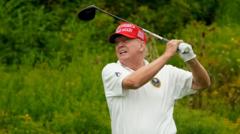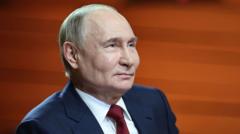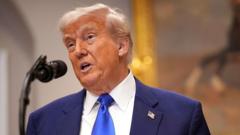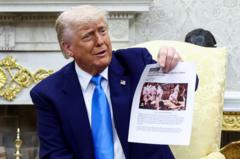As the threat of new tariffs looms, Vietnam aims to enhance its diplomatic relations with the U.S. through unconventional methods. Prime Minister Pham Minh Chinh's willingness to engage in golf with President Trump raises questions about the efficacy of such personal diplomacy. Meanwhile, analysts warn that Vietnam's reliance on Chinese investments and trade deficits with the US may still expose it to tariff vulnerabilities.
Vietnam's Diplomatic Play: Can Golf Diplomacy Thwart Incoming Tariffs?

Vietnam's Diplomatic Play: Can Golf Diplomacy Thwart Incoming Tariffs?
With President Trump poised to introduce new tariffs, Vietnam's Prime Minister suggests a golfing diplomacy to navigate potential economic challenges with the US.
As countries brace themselves for the impact of President Trump’s imminent tariffs, Vietnam is actively seeking to navigate the impending economic turmoil. The U.S. President's move could be seen as a retaliatory measure amid escalating trade tensions, especially following his recent imposition of steep tariffs on foreign carmakers. Vietnam, with its significant trade deficit with the U.S., finds itself in a precarious position as it grapples with an increasingly hostile trade environment.
Prime Minister Pham Minh Chinh has proposed a rather unique approach to protect Vietnam’s economic interests—golf diplomacy. In a light-hearted remark made earlier this year, he expressed a willingness to “golf all day long” with Trump, suggesting that such personal engagement might bolster bilateral relations. Analysts are curious whether this approach could translate into tangible benefits for Vietnam.
Historically, Trump has targeted nations like China for their trade practices, labeling Vietnam as "worse than China." Despite this, the country has not yet faced specific tariffs from the U.S. Currently, Vietnam is trying to maintain a steady trade relationship with the U.S., even while imposing taxes on some imports from there. Recently, the government permitted Elon Musk's SpaceX to trial its Starlink service within Vietnam, a move viewed by some as a strategic bait to keep U.S. favor.
Furthermore, Vietnam has proactively reduced tariffs on several U.S. imports, a step intended to improve its trade balance in anticipation of potential tariffs. This came on the heels of major business deals—over $4 billion—signed between American and Vietnamese companies. The consultancy firm Control Risks indicated that such moves reflect Vietnam’s cautious stance to avoid actions suggesting non-cooperation with the U.S.
The interplay between Vietnam’s relations with both the U.S. and China adds complexity to the situation. Although Vietnam has benefitted from companies exiting China to set up operations in its territory post-tariffs, its economy still heavily relies on Chinese imports. Concerns about growing Chinese investments in Vietnam raise red flags for Trump, who may yet impose sanctions despite diplomatic overtures.
As tariffs loom, the stakes for U.S. businesses operating in Vietnam are high, with manufacturers bracing for possible layoffs should tariffs be enacted. Trump's strategy aims to revive American manufacturing at the expense of cheaper imports, igniting fears among economists that such measures might elevate consumer prices. Meanwhile, Washington has been urging Vietnam to address concerns around "trans-shipments" where Chinese goods flow through Vietnam, further complicating diplomatic relations.
With Vietnam preparing to lower tariffs and bolster U.S. trade relations, the true efficacy of its diplomatic golf-inspired strategy remains uncertain. Both nations will be watching closely as the deadline for Trump’s tariffs approaches, leaving Vietnam in a strategic balancing act to safeguard its economic future while navigating the complexities of international diplomacy.





















